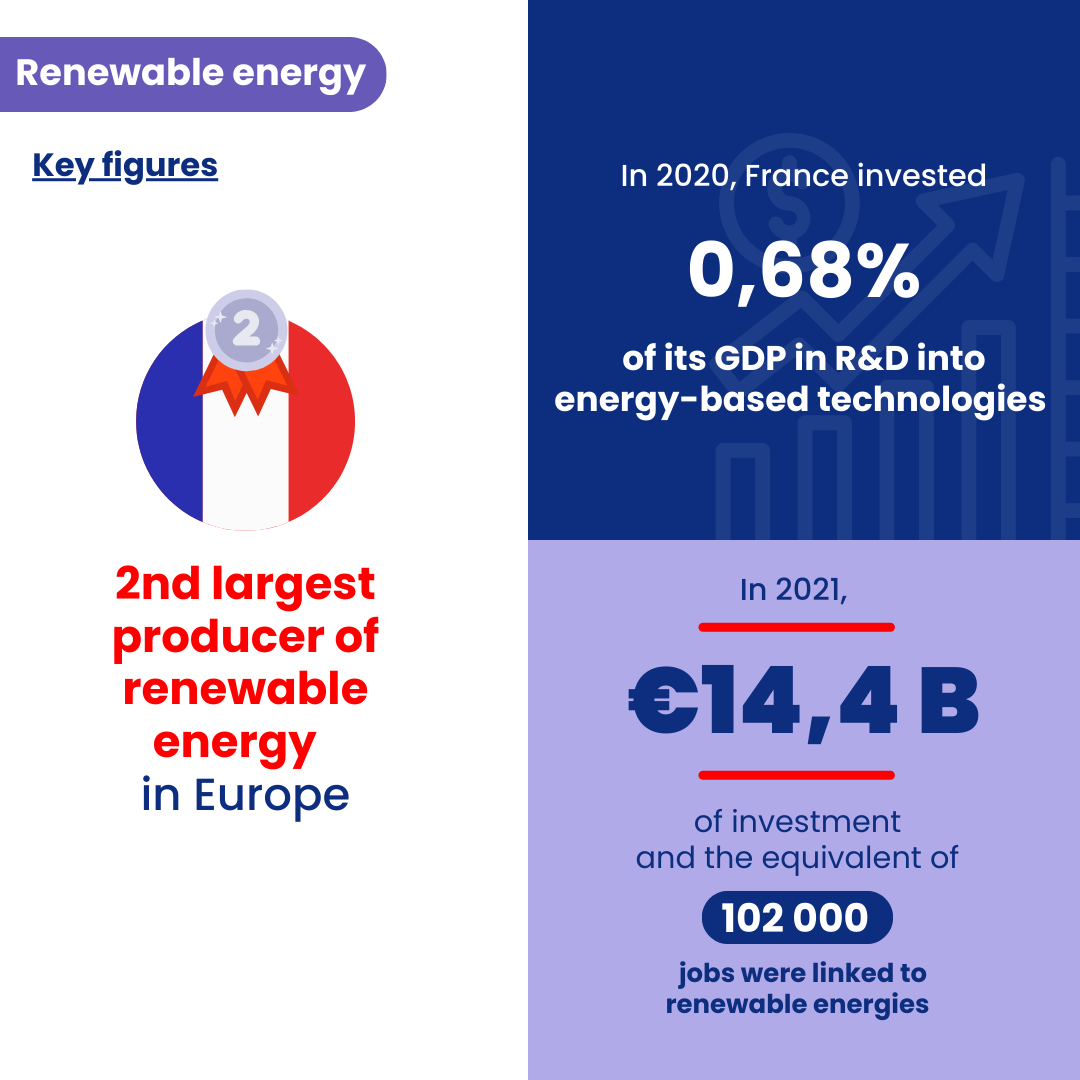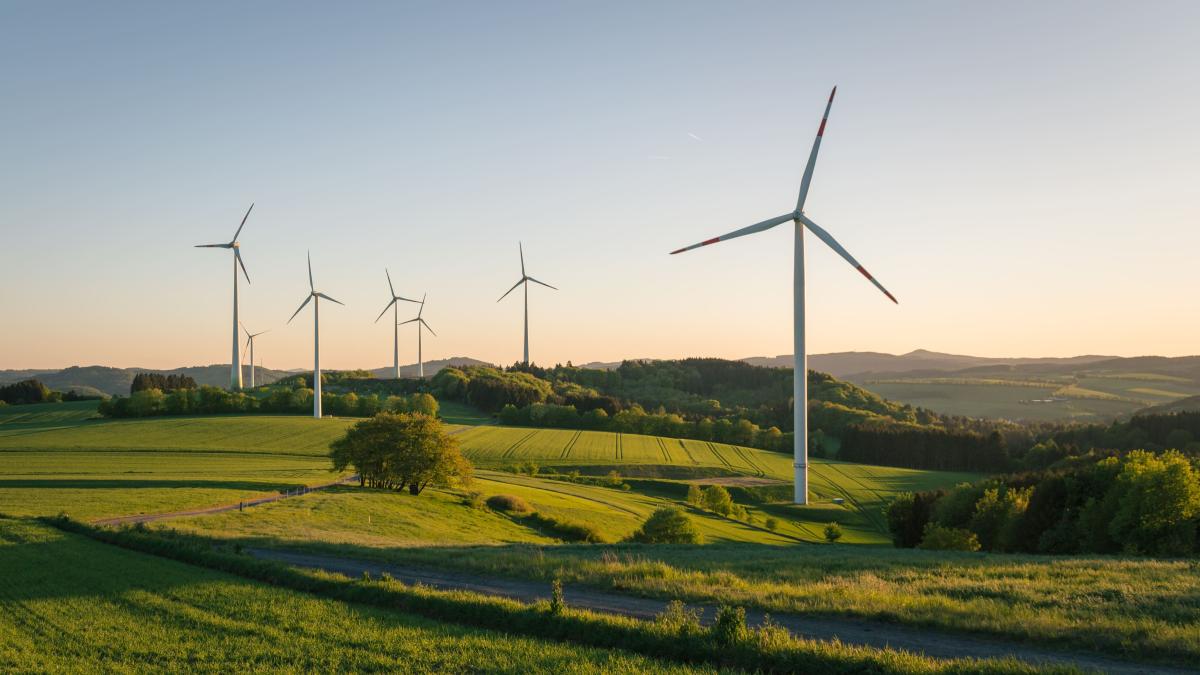France, a driving force behind renewable energy in Europe
Production that is constantly on the rise
Fully committed to a carbon-neutral strategy by 2050, France has been able to instigate bold policies to encourage the growth of renewable energies. The result: today, the country is the second biggest producer of renewable energy in Europe, after Germany. Green energy represents 22% of gross final energy consumption in 2023 compared with 20.5% in 2022. The aim is to increase this share to 33% by 2030.
In parallel, the contribution of the renewable energy sector has continued to grow: in 2021, it received 14.4 billion euros of investment and was responsible for the equivalent of 102,000 full-time jobs. (Source: French Ministry for Ecology and Housing). Highly diverse, the renewable energy sector in France covers ten or so different areas. While wood energy and hydropower remain the most developed, the wind turbine, solar photo-voltaic and heat pump sectors are those that have developed the most in recent years.


An open-air laboratory
In 2022, French public investment in energy R&D increased to a little over 2 billion euros, a rise of 13.6% compared with 2021. With a net increase of 364 millions euros, new energy technologies (renewable energy, energy efficiency, storage, hydrogen etc) represented half of these investments. In addition, France is counting on technological innovation and the expertise of its companies, such as EDF and ENGIE, to develop sustainable solutions. A veritable open-air laboratory for its pioneering projects, the country is classified as the second-most innovative European country in terms of low-carbon energy (Source: Ademe).
“We have a very clear focus: to move away completely from fossil fuels. This approach can be summed up in four ways: energy sobriety, efficiency, renewable energies, and nuclear.”
Bruno Le Maire, former Minister of the Economy, Finance and Industrial and Digital Sovereignty, 16 January 2024 at the French Senate.
The regulatory framework and tax incentives for clean technologies attract leading global players and strengthen the country’s role as a leader in this sector. Furthermore, numerous financial measures such as tax depreciation, reduced VAT rates, and research tax credits for projects linked to clean technologies and energy innovation are further incentives to decarbonise the economy.
Fully committed cities and regions
As cradles of innovation, France’s cities and regions are able to offer a dynamic ecosystem in which companies, scientists and institutions are able to work together in close collaboration. Paris and other major cities such as Nantes, which specialises in offshore wind power, and Bordeaux, widely recognised for its innovations in solar power, are fully committed to energy transition in order to develop more environmentally responsible models.
Paris and its surrounding region are home to several research centres (such as the Centre for Energy and Processes at MINES Paris – PSL), as well as companies and numerous shows dedicated to renewable energy: HyVolution for hydrogen, the National Wind Energy Conference (Colloque National Éolien), and Energy Time, the annual rendez-vous for professionals in the energy management field.
Grenoble: labelled the “Capital of the Alps”, Grenoble is a leading player in energy innovation, in particular thanks to its research into hydro-electricity and green technologies. Every year, the city hosts the Rencontres Business Hydro event.
Lille stands out in the renewable energy sector through research centres such as the Institut Polytechnique de Lille and technology clusters including Euratechnologies. Innovative companies such as Voltalia are also developing advanced solar and wind power projects.
Bordeaux: with its abundance of sunshine, Bordeaux is investing in solar and developing projects around marine renewable energy.
Nantes is a key centre for offshore wind power with companies and laboratories specialising in maritime-based technology. The city hosts the Bio360 Expo show – an event centred around bioenergy and the bioeconomy.
Nancy plays a key role in renewable energy thanks to institutions such as the Université de Lorraine and the Institut National Polytechnique de Nancy.
Strasbourg: The focus of the city is on deep geothermal energy in order to take full advantage of its underground energy resources.
Offshore wind power: A key asset for France in its fight against climate change
Offshore wind power is a major asset in the fight against climate change by providing optimised renewable energy thanks to constant wind out to sea. By replacing fossil fuels, it enables a significative reduction in greenhouse gas emissions, while at the same time creating green jobs and stimulating technological innovation. France has the second largest offshore wind power generation in Europe after the UK and has become a leading player in this field with the aim of having 50 wind farms installed by 2050, generating 40 GW of power. Emblematic projects such as the Saint-Nazaire wind farm also illustrate the country’s commitment, which is supported by government incentives and favourable regulations. By diversifying its energy mix, France is strengthening its energy resilience and making a significant contribution to global energy transition.



